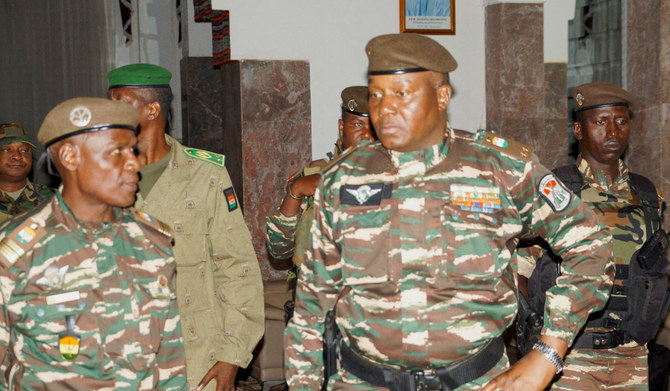NIAMEY: Niger’s junta on Tuesday said that it was open to talks to resolve a regional crisis caused by last month’s military coup, while Russia and the United States called for a peaceful resolution.
Western powers and democratic African governments have called for the coup leaders to reinstate ousted President Mohamed Bazoum, who they have detained since July 26, but the military leaders have refused and rejected attempts at negotiation.
West African army chiefs will meet on Thursday and Friday in Ghana to prepare for a possible military intervention, which the main regional bloc, the Economic Community of West African States (ECOWAS), has threatened to launch if diplomacy fails.
Any military intervention could further destabilize the impoverished Sahel, where an insurgency by groups linked to Al-Qaeda and Islamic State has displaced millions over the past decade and fueled a hunger crisis.
“We are in a process of transition. We have explained the ins and outs, reiterated our willingness to remain open and to talk to all parties, but we have insisted on the need for the country to be independent,” said Ali Mahamane Lamine Zeine, who was appointed prime minister by the military last week.
He spoke after a trip to meet Chad’s President Mahamat Deby, who staged his own coup in 2021. Niger’s takeover is the seventh in West and Central Africa in three years.
The coup and its aftermath have sucked in international powers with strategic interests in the region.
Russian President Vladimir Putin spoke to Mali’s military leader about the recent coup in neighboring Niger on Tuesday, a call likely to cause concern among Western governments that fear growing Russian influence in West Africa’s Sahel region.
Putin “stressed the importance of a peaceful resolution of the situation for a more stable Sahel,” Mali’s interim President Assimi Goita said on social media platform X, formerly known as Twitter.
Pentagon spokesperson Sabrina Singh said US President Joe Biden’s administration was committed to a diplomatic resolution, and said Niger was a partner it did not want to lose.
Singh declined to call the takeover a coup but said it “certainly looks like an attempted coup.”
Meanwhile, ECOWAS has the support of Central Africa’s regional bloc ECCAS in efforts to overturn Niger’s coup and restore constitutional order, Nigerian President and ECOWAS Chairman Bola Tinubu said on Tuesday.
“I understand the fear of our people on any form of military action. We are working to keep the sanctions in place and we are following them to the letter,” he said in a statement.
Russian influence in West Africa has grown while the West’s has waned since a string of coups began. Military leaders in Mali and Burkina Faso have kicked out troops from former colonial power France and strengthened ties with Moscow.
In Mali, the army government also brought in mercenaries from Russia’s Wagner group, who have been accused of executing civilians and committing other grave human rights abuses.
Under Bazoum, Niger remained a Western ally. The US, France, Germany and Italy have troops stationed there under agreements with the now-deposed civilian government.
Putin has called for a return to constitutional order in Niger, while Wagner chief Yevgeny Prigozhin welcomed the army takeover and offered his services.
Support for Russia has appeared to surge in Niger since the coup, with junta supporters waving Russian flags at rallies and calling for France to disengage.
Niger’s coup leaders have revoked a raft of military agreements with France, although Paris shrugged this off by saying that it did not recognize them as legitimate authorities.


























